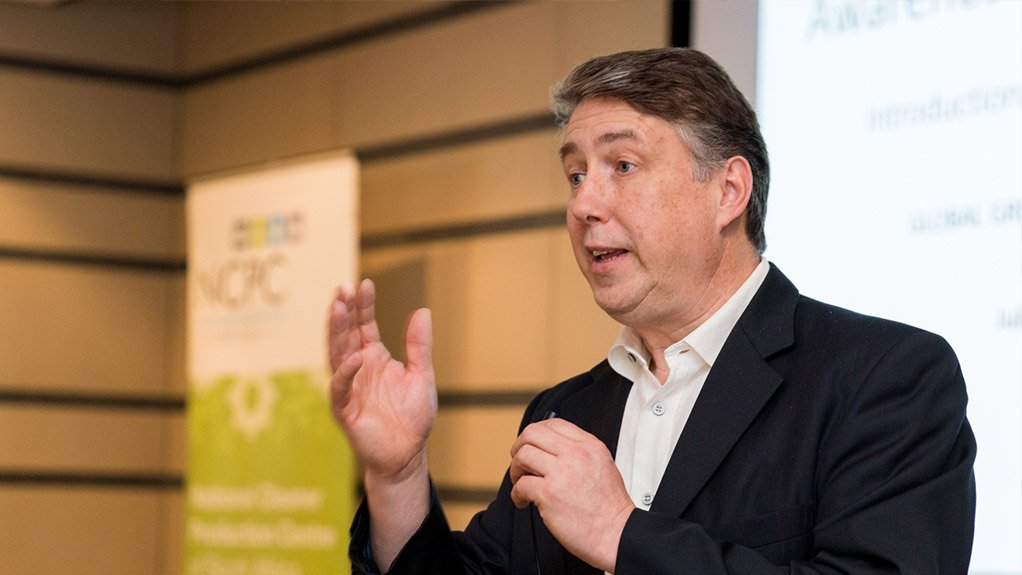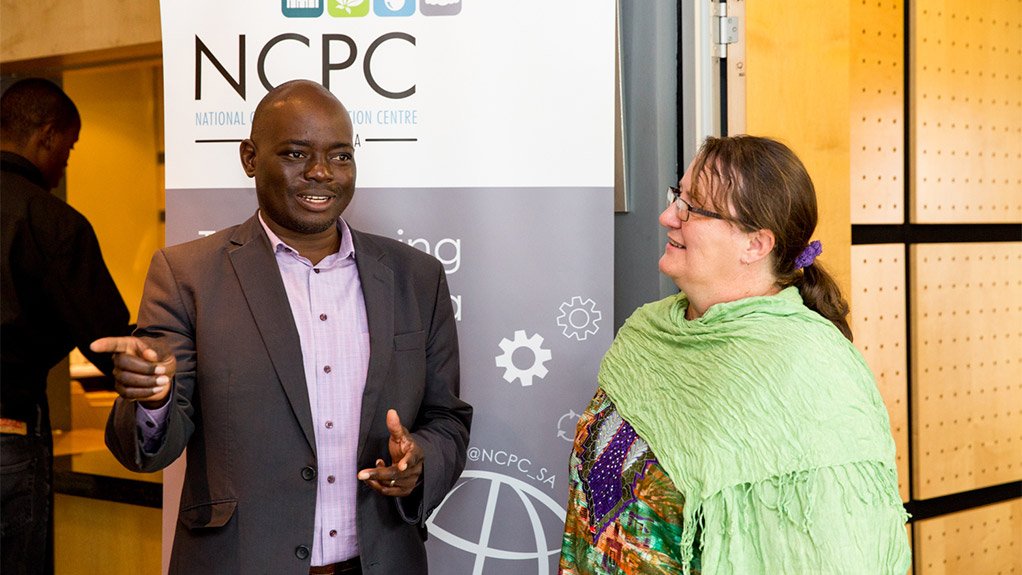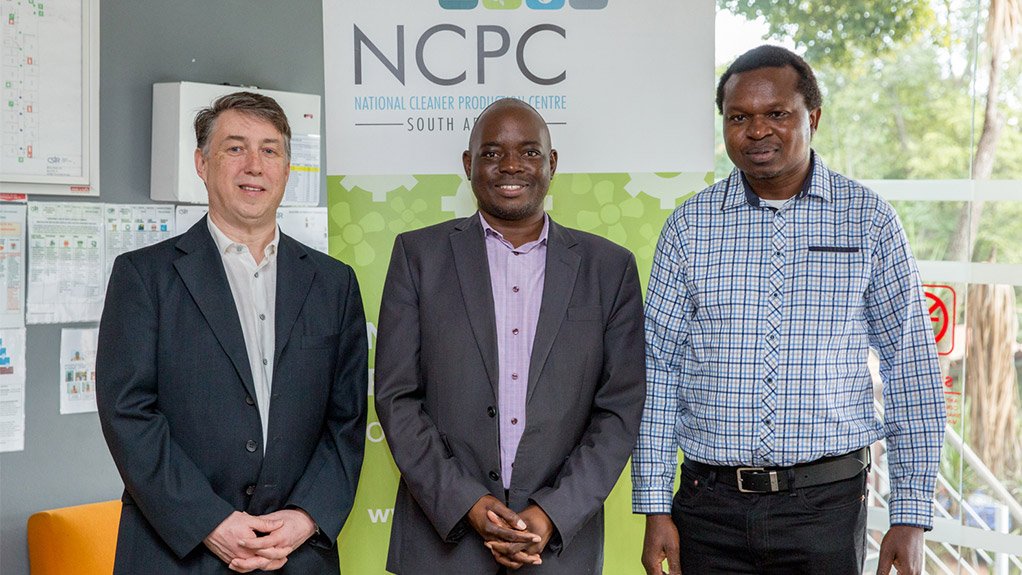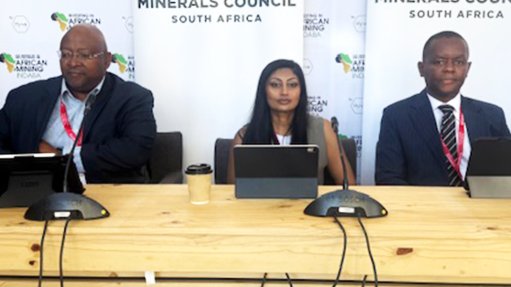First Green Chemistry awareness raising workshop on African soil




Prof Paul Anastas Yale University, a key speaker at the National Cleaner Production Centre South Africa Green Chemistry Workshop and known as the “father of green chemistry”.
Ndivhuho Raphulu National Cleaner Production Centre South Africa Director and Dr Rosa Klein South African Chemical Institute Green Chemistry Chairperson discussing the importance of Green chemistry.
Prof Paul Anastas Yale University, Ndivhuho Raphulu National Cleaner Production Centre South Africa and Dr Alufelwi Tshavhungwe Department of Science and Technology
This article has been supplied.
As part of a global initiative, the National Cleaner Production Centre South Africa (NCPC-SA), in partnership with the United Nations Industrial Development Organization (UNIDO) and the Center for Green Chemistryand Green Engineering at Yale University, hosted a workshop on Green Chemistry in Pretoria on 18 April 2018.
Participants from Cape Town and Durban joined via video conference. Simply put, Green Chemistry is thinking differently about how chemistry and chemical engineering can be done to improve safety, sustainability and efficacy. It emulates nature by using renewable materials that biodegrade easily in the environment and focuses on the inherent nature and properties of chemicals, materials, products, processes and systems; incorporating elements of chemistry, engineering, biology, toxicology and environmental science.
The workshop aimed to raise awareness about green chemistry, its role in society and opportunities in various research areas. It explained the transformational role of catalysis on industry and the associated material and energy benefits.
Other objectives were to assess the impacts of solvent usage and identify green chemistry alternative solvent systems and the subsequent benefits; the advantages and disadvantages of various process feed stocks; discuss ways to reduce or eliminate waste and identify its potential as a feedstock; and to review examples of green chemistry successes in industry and small businesses.
“We are very excited to host this first initiative of the global Green Chemistry Project in South Africa. The workshop was a crucial step in laying the foundation for transformative chemical engineering practices. It served to highlight the need for chemists and engineers to bring their research and innovations in support of green industry, out of the laboratory and into the boardroom,” explains Ndivhuho Raphulu, Director of the NCPC-SA.
Raphulu adds, “The workshop targeted the scientific community as well as industry players. The programme included discussions on chemistry in society, specifically in the health, transportation, communication and economic spheres. We looked at the unintended consequences of doing the right things in the wrong way, for example the use of pesticides in food production, and water purification using lethal substances, among others. All of these, of course, must be considered against the backdrop of our population, energy challenges, global change, resource depletion, food supplies, and so on.”
Delegates also reviewed the 12 principles* of green chemistry as developed by Prof Paul Anastas from Yale University, a key speaker at the workshop and known as the “father of green chemistry”. The principles enable scientists and engineers to create innovative ways to reduce waste, conserve energy, and discover replacements for hazardous substances.
“In South Africa, we have made some strides in promoting and implementing resource efficient and cleaner production practices – from saving energy and water, reducing and re-using waste, to improving life-cycle management skills. We support green business entrepreneurship and the use of sustainable consumption and production practices to generate growth, create jobs and reduce poverty.
The Green Chemistry Project is a natural and necessary progression in our mission to contribute to sustainable and responsible industrial development and a competitive South Africa,” Raphulu concludes.
• The NCPC-SA is a programme of the Department of Trade and Industry, and hosted by the Council for
Scientific and Industrial Research.
Article Enquiry
Email Article
Save Article
Feedback
To advertise email advertising@creamermedia.co.za or click here
Press Office
Announcements
What's On
Subscribe to improve your user experience...
Option 1 (equivalent of R125 a month):
Receive a weekly copy of Creamer Media's Engineering News & Mining Weekly magazine
(print copy for those in South Africa and e-magazine for those outside of South Africa)
Receive daily email newsletters
Access to full search results
Access archive of magazine back copies
Access to Projects in Progress
Access to ONE Research Report of your choice in PDF format
Option 2 (equivalent of R375 a month):
All benefits from Option 1
PLUS
Access to Creamer Media's Research Channel Africa for ALL Research Reports, in PDF format, on various industrial and mining sectors
including Electricity; Water; Energy Transition; Hydrogen; Roads, Rail and Ports; Coal; Gold; Platinum; Battery Metals; etc.
Already a subscriber?
Forgotten your password?
Receive weekly copy of Creamer Media's Engineering News & Mining Weekly magazine (print copy for those in South Africa and e-magazine for those outside of South Africa)
➕
Recieve daily email newsletters
➕
Access to full search results
➕
Access archive of magazine back copies
➕
Access to Projects in Progress
➕
Access to ONE Research Report of your choice in PDF format
RESEARCH CHANNEL AFRICA
R4500 (equivalent of R375 a month)
SUBSCRIBEAll benefits from Option 1
➕
Access to Creamer Media's Research Channel Africa for ALL Research Reports on various industrial and mining sectors, in PDF format, including on:
Electricity
➕
Water
➕
Energy Transition
➕
Hydrogen
➕
Roads, Rail and Ports
➕
Coal
➕
Gold
➕
Platinum
➕
Battery Metals
➕
etc.
Receive all benefits from Option 1 or Option 2 delivered to numerous people at your company
➕
Multiple User names and Passwords for simultaneous log-ins
➕
Intranet integration access to all in your organisation





















